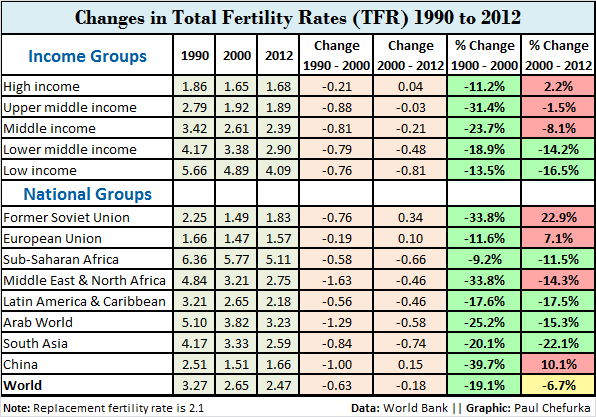Environment & Energy
Related: About this forumThe fight against population growth: winners and losers
I've been mining the World Bank dataset to find out how the world is doing in our efforts to curb population growth.
In the process I discovered a few interesting things. One is that almost half the world's population lives in countries whose Total Fertility Rate (TFR) is below the replacement value of 2.1. Another is that the drop in fertility rates has slowed recently, and in some cases has even reversed and begun to climb.
Overall, I found that fertility rates around the world are not declining as fast as they need to in order to promote a near-term peak in population levels. In particular, the world's performance in the last decade or so has been anemic compared to the decade of the 90's.

The former Soviet Union, the European Union and China made particularly poor showings over the last decade. In dramatic contrast, the low income nations including sub-Saharan Africa have done extremely well at reducing their high fertility rates.
Along the way I also found support for both the Demographic Transition theory (i.e. the more industrialized and wealthier a nation becomes, the more its fertility rates fall) and for Virginia Abernethy's Fertility Opportunity Hypothesis which predicts that fertility rates will follow perceived future economic opportunity.
The European Union and South America provide examples of how rising industrialization and wealth promote lower fertility rates. Here I use per capita primary energy consumption as the proxy for industrialization:


In contrast, Sub-Saharan Africa is reducing their fertility rates without increased energy use, possibly by increasing education:

The most obvious support I found for Abernethy's Fertility Opportunity Hypothesis came from the former Soviet Union. Its economic crash in 1989 prompted a rapid reduction in fertility rates, and its recovery was followed seven years later by rising fertility rates:

When the FSU's fertility rates are mapped against energy use, the crash is revealed as declining fertility coupled with declining energy use. This is the opposite coupling from a growing region like South America, where declining fertility is associated with rising energy use. In the following graph the recovery is also visible as the "doubling back" or loop in the lower left.

This finding gives some support to my hypothesis that the only thing that will rapidly reduce population levels (as well as the associated CO2 emissions) is a severe, sustained economic downturn.
We have a long way to go yet before population growth is under control. Please do not have any more children.
hunter
(38,311 posts)It was the Catholic way. Our kids have many aunts, uncles, and cousins.
My mom was aiming for nine kids or more when she decided she wasn't going to be a nun and would instead get married and have lots of unprotected sex with my dad. But in the 'seventies both my parents and my wife's parents became heretics and started using artificial birth control.
My wife's siblings and my siblings haven't exceeded population replacement rate. We're all at 0,1,2, or 3 kids, including adoptions. Averaged, less than two kids for each couple.
In our generation wild hanging from tree limbs bonobo sex does no longer equals more babies. It's just fun.
The most powerful environmental policy anyone can pursue is the political and financial empowerment of women, good sex education, and universally available birth control.
Whatever new solar panel or fuel celled car one might build is less important.